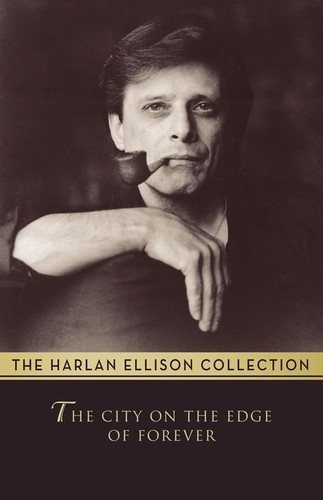Review: The City on the Edge of Forever [★★★★☆]

The City on the Edge of Forever
by Harlan Ellison
My rating: ★★★★☆
Read From: 14 March 2014 – 17 March 2014
Goal: Non-Fiction
"The City on the Edge of Forever" — quite possibly the best Star Trek episode ever filmed. I always knew it was one of my favorites. I didn't know, until I read this book, that it's also been dogged by controversy. The script that was filmed was far different from the story that Ellison envisioned and the script that he wrote. Gene Roddenberry spent years telling everyone that Ellison's script was horrid, too expensive to shoot, and "had my Scotty selling drugs on the Enterprise".
Here, Harlan Ellison lays out his defense in great detail. The defense often veers into (and dwells in) cranky old man territory. But, reading the defense, Harlan Ellison is quite justified in his cranky anger and exasperation. His script wasn't horrid, didn't have to be expensive to shoot (and, in fact, wasn't), and definitely didn't feature Scotty selling drugs. In fact, Scotty never even appeared in the episode.
This book includes Ellison's original draft script and several revisions of the script. Any one of them is better than what actually aired. Ellison is right to say that the produced version is a butchered shadow of his original vision. His story was richer and more morally ambiguous.
Ellison's script featured a drug dealing Enterprise officer (not Scotty!), who changed human history during an escape attempt. It included Kirk who, paralyzed by love, was unable to let Edith Keeler die in order to save history. The drug dealing officer, evil throughout the script, stepped forward to save Keeler. Spock, more coldly logical and alien than ever, bodily stopped him, forcing Keeler to die.
The script forced you to ask whether, in this moment, Spock was the better Starfleet officer and Kirk the better man. Or was Kirk a worse man because he was willing to save the woman he loved and condemn everyone else he ever knew to oblivion? Was Kirk a hero or a monster? Was Spock a hero or a monster? And why was it that the drug dealing officer had to be prevented from doing his one selfless act of the episode?
The script didn't give easy answers and it didn't portray a perfect humanity, free from problems. Of all of the Star Trek episodes I've seen, this unaired version was the most ... human. I wish it had been aired and Harlan Ellison is absolutely right to have defended it as vigorously as he did. This book is worth reading even if you just flip directly to the scripts and read the various treatments and afterwards.
This entry was tagged. Book Review Review Science Fiction